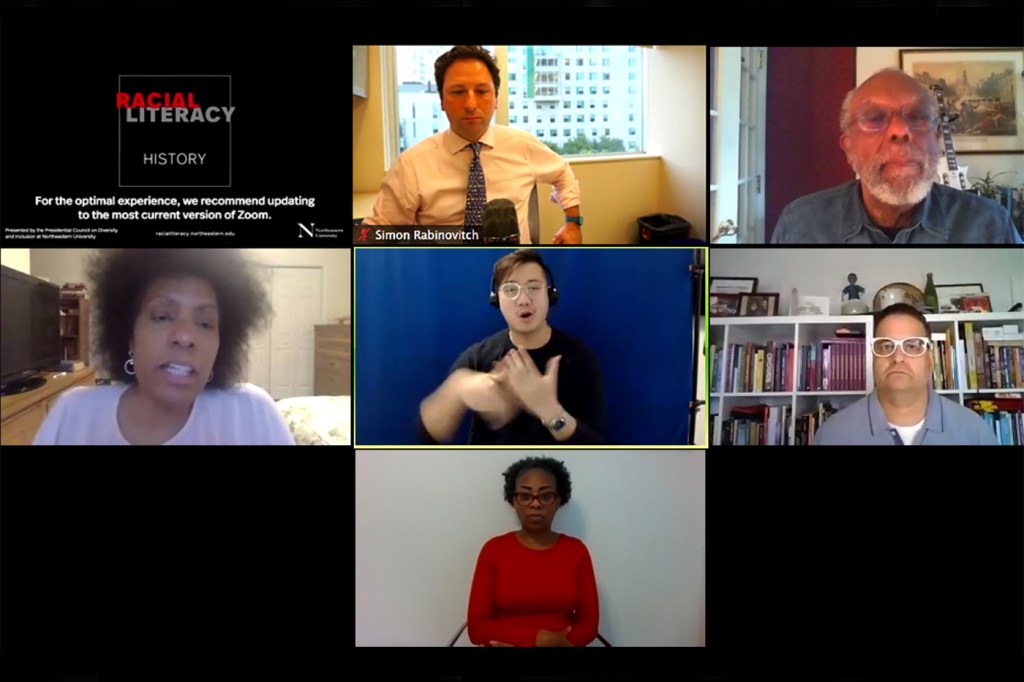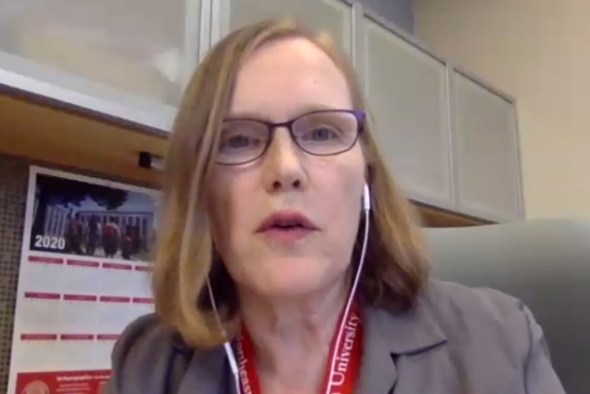Northeastern’s Racial Literacy series takes on Boston’s troubled history

To millions of tourists, Boston is the city of the Super Bowl-winning New England Patriots, Paul Revere, world-class universities, and a distinctive accent.
But a diverse panel of Northeastern University faculty assembled on Tuesday to present a side of the city that most visitors will never learn about from glowing travel website reviews—a history of slave-trading, violent opposition to desegregation in public schools, and an historical dearth of leadership roles for people who aren’t white.
Patricia Davis, a cultural studies scholar who teaches in the College of Arts, Media, Arts and Design, recounted Boston’s reputation as an unwelcoming city that was captured in an episode of “The Simpsons,” when Homer and Marge traveled to the New England city.

Uta G. Poiger, Dean of the College of Social Science and Humanities and Professor of History. Screenshot by Northeastern University
“They made a point to say that it was overt, not implicit racism. You may be thinking ‘Well, it’s a cartoon. It’s not really an indication of reality.’
But media productions are sometimes spot-on in capturing “the social, cultural and political pulse of the moments in time in which they are produced,” Davis said at the livestreamed event, part of Northeastern’s Racial Literacy series.
“And that’s part of the work that Black history does,” she added. It serves as a counterpoint to otherwise rosy views and allows for a greater understanding of what needs to be done to attain a more equitable present and future.
Hours earlier in the day, Boston Mayor Marty Walsh encouraged business leaders to think hard about diversifying their workforces in a city with a pronounced wealth gap between Black and white residents.
Davis was one of four faculty members who took part in this second installment of the Racial Literacy series. While the first episode examined the larger role of racism in society, this episode took an unvarnished view of Boston’s uncomfortable racial past.
Davis was joined by Ted Landsmark, distinguished professor and director of the Kitty and Michael Dukakis Center for Urban and Regional Policy; Simon Rabinovitch, an associate professor who teaches Jewish, European, Russian, and legal history; and Ángel Nieves, a professor of Africana Studies, History, and Digital Humanities who described himself as “the gay son of two Puerto Rican Americans.”
To a speaker, they described The Hub in glowing terms, but also offered candid descriptions of their experiences with racism, in Boston and beyond.
Davis, who is Black and left a teaching position in Atlanta for a similar role at Northeastern, said her decision to relocate to a mostly white city left her Black friends puzzled and bewildered.
“Their collective memories of Boston inform their perception of the city in the present,” she said. “And what they remember most is the busing crisis of the 1970s, the images which undercut the city’s image, mostly produced through its abolitionist history, as a beacon of progressive progressivism.”
Rabinovitch reflected on the time he moved to Boston and glimpsed a Black church with the star of David in a stained glass window above the front door, indicating it was once a synagogue. The home of the Columbus Avenue AME Zion Church since 1902, it had once been the site of contentious battles during the early civil rights movement and efforts to strategize how to fight for greater Black rights, he said.
“Jews and Blacks lived together for long stretches, mostly harmoniously, in mixed neighborhoods in the West End, South End, Roxbury and Dorchester,” he said.
Landsmark, who oversees the Open Classroom at Northeastern and will be teaching a course on Black leadership in the spring, was of the first young people to be bussed in New York City shortly after the Brown vs. Board of Education Supreme Court decision desegregating public schools was handed down.
The ruling opened a new world, exposing him to young people whose aspirations far exceeded anything he saw in his Harlem neighborhood. For the first time, he met parents who were lawyers, doctors, accountants, and other kinds of professionals.
“Ultimately, I found myself really living out what W.E.B. Dubois had said about developing a double consciousness. I knew the life and culture of Harlem, but I also knew the life and culture of one of New York City’s Jewish communities. And that wider cultural experience at an early age made me much more resilient to many of the kinds of things that I encountered later in life.”
Nieves also knew what it was like to straddle two worlds. His father, a superintendent in a co-op building in Queens, N.Y., had dark skin, but Nieves, his mother, and his sister could pass for “honorary whites.”
“Our skin color often allowed us to pass without women suddenly clutching their purses more tightly or crossing the street. What often gave us away, however, was talking in Spanish.”
He pivoted from his upbringing to a time when he was working in the South African township of Soweto, home to anti-apartheid activist and former South African president Nelson Mandela. A mural of Mandela in the gentrifying Boston neighborhood of Roxbury, near Northeastern, was bulldozed to make way for mixed-use housing.
“This history of removal and displacement because of the legacy of urban renewal — and its latest incarnation as millennial gentrification — is a complex, messy and fraught story,” he said.
“I am only now learning about this history as a new Boston resident who has already begun to question out loud, in meetings with stakeholders and local public history practitioners, my own uneasiness about the ways that some of these histories still remain very neatly packaged for tourists.”
The next Racial Literacy livestream on Oct. 13 looks at culture’s role in understanding race. The fourth and final episode a week later examines policing.
For media inquiries, please contact media@northeastern.edu.





